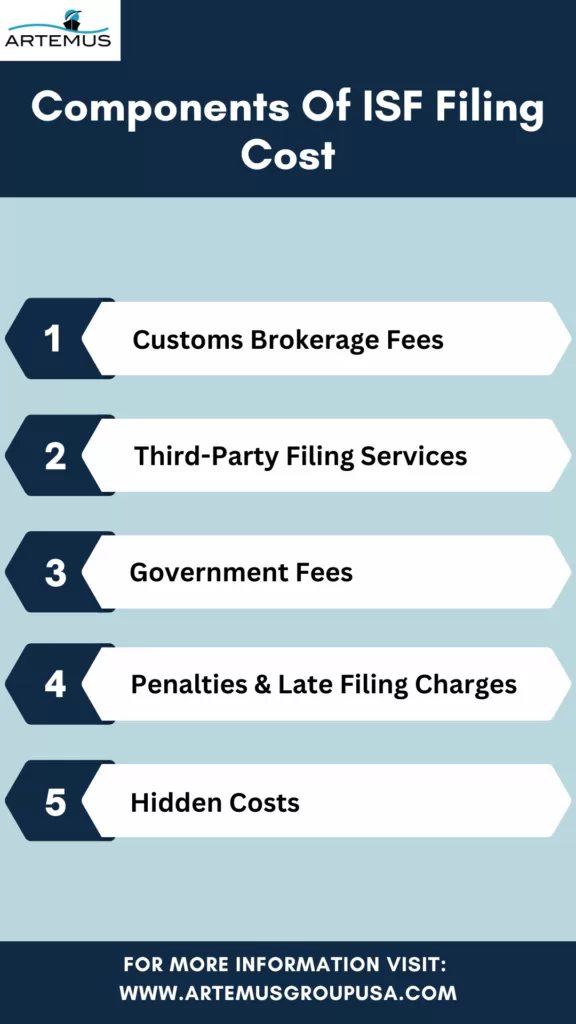
What Is Inbound Logistics & Outbound Logistics? A 2025 Guide
In the dynamic world of supply chain management, understanding the nuances of inbound and outbound logistics is crucial for operational

In today’s global economy, international trade has become a cornerstone of business growth and expansion. However, with the rising tide of trade comes an array of regulations and requirements, especially when it comes to importing goods into the United States.
One such vital aspect is the Importer Security Filing (ISF) program, which plays a significant role in maintaining supply chain security. While importers acknowledge the importance of ISF compliance, they must also navigate the financial implications of this essential process – the ISF Filing Cost.
In this blog, we will set sail on a journey to explore the depths of ISF Filing Cost, uncovering the factors that influence it, and charting a course toward effective cost optimization. Artemus offers ISF compliance support through its comprehensive software solution, streamlining the filing process and ensuring smooth international trade operations.
Table Of Contents
ISF filing cost refers to the financial expenses associated with submitting the necessary data to comply with the Importer Security Filing program. It encompasses various fees and charges incurred throughout the filing process. Understanding these costs is essential for importers to factor them into their overall budget and ensure smooth and compliant international trade operations.
As an essential component of the overall import process, ISF filing cost plays a crucial role in the financial planning and execution of international trade operations. Understanding the different aspects of ISF filing costs helps importers allocate appropriate resources, optimize expenses, and ensure a smooth supply chain process.
The average cost of ISF filing typically ranges from $30 to $150 per filing, depending on factors such as the filing method, service provider fees, shipment complexity, and the volume of imports.
Related: ISF Filing Requirements: Important Facts & Documents
Here are the key components of ISF filing cost:

Importers often seek the expertise of licensed customs brokers to handle their ISF submissions. Customs brokers charge a fee for their services, which can vary based on the complexity of the shipment and the broker’s experience.
Some importers opt for third-party filing services that specialize in ISF submissions. These dedicated service providers assist importers in preparing and submitting the required information to the CBP. Like customs brokers, third-party filing services also charge a fee for their assistance.
The CBP imposes government-mandated fees for ISF filings. These fees are non-negotiable and must be paid separately from any charges incurred for customs brokerage or filing services. Importers should be aware of these official fees and budget for them accordingly.
Timely and accurate filing is of utmost importance in the ISF program. Failure to comply with the ISF requirements or submitting incorrect information can lead to penalties and late filing charges. These charges can be significant and may disrupt the smooth flow of shipments.
Importers must also consider potential hidden costs associated with ISF filing. For instance, if the filing fees are in a foreign currency, currency conversion fees may apply. Moreover, delayed cargo clearance due to inaccurate or incomplete filings can result in storage and demurrage charges.
Related: ISF Filing Deadline: Timeline, Consequences, & Exceptions
As importers navigate the ISF filing process, they must consider various factors that influence the overall filing cost. Understanding these factors is essential for efficient financial planning and ensuring compliance with regulatory requirements.
Related: 5 Types Of ISF Penalty & Fines To Know To Avoid Losses
Importers have two primary options for fulfilling this requirement: self-filing or utilizing the services of a customs broker or a third-party filing service. Each approach has its own cost implications, and understanding the differences is crucial for importers to make informed decisions.
Pros: Self-filing allows importers to have direct control over the filing process. It may result in cost savings as there are no intermediary service fees involved. Importers with in-house expertise in customs regulations and filing procedures can benefit from this option.
Cons: Self-filing demands a thorough understanding of the ISF requirements and can be time-consuming. Importers without prior experience in customs procedures may face challenges and risks of inaccuracies, leading to potential penalties and additional costs.
Pros: Customs brokers and third-party filing services are experts in customs regulations, ensuring accurate and timely ISF submissions. Their experience and knowledge reduce the risk of errors and potential penalties. Importers can benefit from a streamlined process, saving time and effort.
Cons: Utilizing a customs broker or third-party service incurs additional fees, which become part of the overall ISF filing cost. Importers must carefully assess the service providers’ charges to determine their impact on the budget.
Related: What Does ISF Stand For In Shipping? The 10+2 Rule Explained
Identifying these hidden costs is essential for accurately assessing the true cost of ISF filing and avoiding unforeseen financial burdens.
Related: ISF Declaration: Meaning, Purpose, Timeline, & Process
Cost optimization in ISF filing involves strategic planning and smart practices. Here are five tips to help importers optimize their ISF filing costs:
Related: ISF Filing: A Compliance-Related Guide & Software Solution
The ISF filing fee typically ranges from $30 to $150 per filing, depending on factors such as the filing method, service provider fees, shipment complexity, and the volume of imports. However, fees may vary over time and among different customs brokers or third-party filing services, so it’s advisable to consult with service providers for the most current and accurate cost estimates.
ISF filing can be provided by either the importer themselves (self-filing) or by licensed customs brokers and third-party filing service providers who specialize in handling the ISF process on behalf of the importer.
ISF filing for USA shipments is a mandatory security program requiring importers to submit essential shipment information to the US Customs and Border Protection before the cargo departs for the United States.

In the complex realm of international trade, the Importer Security Filing (ISF) program stands tall as a vital pillar of supply chain security. Throughout this journey, we have unraveled the significance of ISF Filing Cost, and understanding its influence on financial planning and compliance.
As importers, recognizing the components that contribute to ISF Filing Costs allows us to make informed decisions in choosing the right filing method, negotiating service fees, and prioritizing accuracy and timeliness. By leveraging technology and staying proactive, we can steer clear of hidden costs, optimizing our ISF filings for smoother, cost-effective, and secure trade voyages.
Related: ISF Filing Online: A Beginner’s Guide To Your Import Process

In the dynamic world of supply chain management, understanding the nuances of inbound and outbound logistics is crucial for operational

In today’s interconnected world, businesses rely heavily on global trade to expand their markets, access new resources, and drive growth.

Importing goods for resale in the USA presents a lucrative business opportunity, but navigating the complexities of U.S. customs regulations,
Get In Touch
Artemus’ Software Solutions for ISF, AMS, Japan AFR, eManifest Canada, & Panama B2B filings.